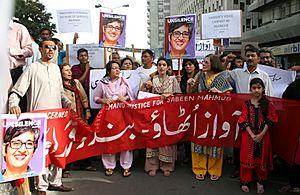Sabeen Mahmud facts for kids
Quick facts for kids
Sabeen Mahmud
صبین محمود |
|
|---|---|
| Born | 20 June 1974 Karachi, Pakistan
|
| Died | 24 April 2015 (aged 40) Karachi, Pakistan
|
| Cause of death | Shot by armed gunmen |
| Nationality | Pakistani |
| Occupation | Human rights activist, social activist, NGO worker |
Sabeen Mahmud (born June 20, 1974 – died April 24, 2015) was a brave Pakistani activist. She worked for human rights and helped her community. Sabeen was best known for starting a special cafe in Karachi called The Second Floor (T2F).
Sabeen grew up in Karachi. She went to Karachi Grammar School and then Kinnaird College. Later, she started a company that helped people use technology. She also helped create the Citizens Archive of Pakistan, which collects stories about Pakistan's history.
In 2007, Sabeen opened T2F. It was a place where people could meet, talk, and share ideas freely. Under her guidance, T2F held many events that encouraged open discussions. She also helped lead protests against the Red Mosque in Islamabad. Sabeen was part of a group called Pakistan for All. This group worked to stop fighting between different religious groups in Pakistan.
On April 24, 2015, Sabeen hosted a discussion about a conflict in Balochistan. After the event, she was sadly shot and killed on her way home. She is remembered as an important voice for freedom and change in Pakistan.
About Sabeen Mahmud
Sabeen Mahmud wanted to fight against unfairness and discrimination. She hoped to make people think more deeply about things. She once told a newspaper that her biggest dream was to "change the world for the better through the Internet." Sabeen also started an organization called PeaceNiche. This group aimed to create a place where people could work together for good causes.
Her Early Work and Ideas
Sabeen founded a small technology company called "bits" with a friend, Zaheer Kidvai. She had worked with him since she was 14 years old. She saw him as a mentor.
In 2006, she opened The Second Floor (T2F). This cafe became a hub for many activities. It hosted public discussions, showed films, and held poetry readings. People could also enjoy stand-up comedy and live plays there.
In 2013, Sabeen helped organize Pakistan's first "civic hackathon" at T2F. This event brought together people from different fields. They worked together to find new ways to solve problems in their community. Sabeen invited many public figures to T2F. One guest, Ayesha Siddiqa, wrote a book about military funding. This led to the Inter-Services Intelligence contacting T2F.
Standing Up for Freedom
Sabeen believed in open spaces and freedom. In 2013, she told Wired magazine that she did not want armed guards at T2F. She said, "that’s the price you pay for having a public space." She believed that fear should not stop people from doing important work. Her efforts and ideas were noticed by news outlets around the world.
Her Passing
On the night of April 24, 2015, Sabeen Mahmud was shot and killed. This happened as she was driving home after hosting a seminar. The event was held at her cafe, T2F. Her car was stopped at a traffic light when gunmen attacked.
Police said her murder was a direct "target killing." This means she was specifically chosen to be killed. Her mother, Mahenaz Mahmud, was also hurt in the attack. She was taken to the Aga Khan Hospital for treatment.
The seminar Sabeen hosted was called 'Unsilencing Balochistan (Take 2)'. It focused on issues in Balochistan. One of the speakers was a Baloch activist named Mama Qadeer. The event had been moved to a different date and place because the organizers had received threats earlier.
Many important people in Pakistan spoke out against Sabeen's killing. The Chief Minister of Sindh, Qaim Ali Shah, and Prime Minister Nawaz Sharif both condemned the act. They asked for an investigation. People on social media, including famous writers and activists, also expressed their sadness and anger.
On May 20, 2015, authorities announced that they had arrested the person responsible for Sabeen's murder. The accused was identified as Saad Aziz.
See also
- Human rights in Pakistan
- Targeted killings in Pakistan
 | Georgia Louise Harris Brown |
 | Julian Abele |
 | Norma Merrick Sklarek |
 | William Sidney Pittman |


